Despite being selected in the second round, Robinson was actually Montreal's forth pick, as they had choices #1 overall (Guy Lafleur), #7 (Chuck Arnason) and #11 (Murray Wilson) in the first round out at total of just 14 at the time. Additionally, after picking Robinson with the 6th pick of the second round, they also had picks 24 (Michel DeGuise) and 25 (Terry French) later in Round 2 after selecting Robinson! Additionally, the Canadiens had the #3 pick in the third round, giving them 7 of the first 31 choices.
Robinson, born on this date in 1951, turned pro the following season with the American Hockey League's Nova Scotia Voyageurs. He played 74 games of the 1971-72 season, scoring 10 goals and 24 points during the regular season as well as 12 points in 15 playoff games as the Voyageurs won the Calder Trophy as AHL champions, making them the first Canadian-based team to ever do so.
For the 1972-73 season, Robinson played in 38 games for Nova Scotia in the AHL, scoring at a point-per-game clip with 39, before making his debut with the Canadiens, with whom he played 36 games, which included scoring his first NHL goal. He also got his first taste of what would end up being a record setting playoff career when he contributed a goal and 4 assists in 11 playoff games as the Canadiens defeated the Buffalo Sabres 4 games to 2, eliminated the Philadelphia Flyers in 5 before capturing the first Stanley Cup of Robinson's career when they prevailed 4 games to 2 over the Chicago Black Hawks.
Robinson, nicknamed "Big Bird" for his 6' 4", 225 lbs of imposing size, was now a full-time NHL regular beginning with the 1973-74 season, playing in all 78 of Montreal's games. His durability was soon apparent, as he would play three consecutive seasons without missing a single game.
With his obvious talent, he was given more responsibility and power play time over the next two seasons as his point totals rose from 6 in his initial half season in 1973 to 26 in 1974 before reaching 61 in the 1974-75 season, which included his first of nine consecutive seasons of 10 goals or more when he found the net 14 times. In addition to his 61 points, Robinson also had a +/- rating of +61 with the high powered Canadiens.
The 1975-76 season saw Montreal finish first overall with 127 points from a 58-11-11 record and give up the least amount of goals during the regular season with 174, 16 less than the next closest team and less than half the amount allowed by the expansion Kansas City Scouts (351) and Washington Capitals (394). Montreal then steamrolled all before them in the playoffs, defeating Chicago in 4 straight, the New York Islanders in 5 and won the second Stanley Cup of Robinson's career with another sweep, this over the Flyers, giving Montreal a final playoff record of 12-1.
Later that fall, Robinson found his first success on the international stage, helping Canada capture the 1976 Canada Cup.
The 1976-77 season saw Robinson set career highs with 19 goals, 66 assists and 85 points as well as an final +/- rating of +120, by far his finest as his second best was "just" +71! His +120 rating is the second highest in NHL history and one of only two seasons in which a player was +100 or greater. The only negative to his outstanding season was the end of his consecutive games streak as he missed 3 games that year.
The Canadiens exceeded their previous season by finishing with a 60-8-12 record for 132 points, 20 more than Philadelphia. They again tore through the postseason, this time with a 12-2 record, sweeping the St. Louis Blues, eliminating the Islanders in 6 and dominating their arch rivals by outscoring the Boston Bruins 16-6 in another four game sweep for Robinson's third Stanley Cup. In recognition of his stellar regular season, Robinson was named the winner of the 1977 Norris Trophy as the NHL's Best Defenseman.
He once again played in every one of Montreal's games during the 1977-78 season, eventually scoring 65 points to go along with his +71 rating. The Canadiens once again won the President's Trophy for the most points during the regular season with 129 (59-10-11) and once more backed that up with a Stanley Cup championship after defeating the Detroit Red Wings in five, sweeping the Toronto Maple Leafs in 4 and once again beating the Bruins in the finals, this time in 6 games.
Robinson had an outstanding playoff, tying Lafleur in postseason scoring with 21 points in 15 games, with Robinson scoring 4 goals and adding 17 assists. His play was recognized when he was named the winner of the Conn Smythe Trophy as the playoff MVP, only the fourth defenseman to win it since it was introduced in 1965. In the 37 years since Robinson won the Conn Smythe, only six other defenseman have been named its recipient.
While Montreal was edged in 1978-79 by a single point by the Islanders for the best overall record, 116-115, Robinson had his usual solid season on the Canadiens blueline with a +50 rating as well as a 16 goal, 61 point season. They victimized Toronto to open their playoffs with another four game sweep, but then required the full seven games to outlast the Bruins to advance to the finals, where they rebounded from a Game 1 loss to the New York Rangers by winning the next four to win their fourth straight Stanley Cup and cement their place as one of hockey's most dominant dynasties. The championship was Robinson's fifth in seven seasons.
The 1979-80 season was one of Robinson's finest offensive seasons, having scored 14 goals and 75 points, the second highest of his career to date, which would eventually rank third in his career. After missing eight games, his 75 points in 72 games would give him an average of over a point per game that season. After defeating Buffalo in three games in the opening round of the playoffs, their streak of four championships would come to an end with a 3-2 loss at home in Game 7 of Round 2. Following the season, Robinson was named the winner of his second Norris Trophy.
Robinson was limited to 65 games in 1980-81, but still managed to score 50 points. Following the Canadiens early exit from the playoffs after just three games, Robinson took advantage of the rare opportunity and played for Canada in the only World Championships of his career in Sweden, scoring a goal and two points in 6 games. He was also named as the tournament's Best Defenseman and a member of the the World Championship All-Star Team. Later that fall, Robinson was a member of Team Canada for the 1981 Canada Cup.
The next four seasons were highlighted by the 1982-83 season when Robinson scored 14 goals and 63 points, his highest total between 1980-81 and 1984-85. He also was the captain of a victorious Team Canada at the 1984 Canada Cup tournament, his second success at the Canada Cup in three tries.
Robinson had the second finest offensive season of his career in 1985-86 when he equaled his career best with 19 goals on his way to 82 points. He was also named as an assistant team captain for Montreal, an honor he would hold for the remainder of his time with the Canadiens.
After waiting out the Islanders run of four Stanley Cups, the Canadiens returned to the peak by interrupting the Edmonton Oilers run of four cups in five years when they surprised the hockey world by defeating Boston in three straight, the Hartford Whalers in seven, the Rangers in five and the Calgary Flames in a five game final as the seventh seed to capture the sixth Stanley Cup of Robinson's career. He led the Canadiens defensemen in playoff scoring with 13 assists, good for fourth on the team.
Robinson would play three more seasons for Montreal, giving him a total of 17 seasons with the Canadiens. However, those final three seasons saw his point totals decline each season from 50 to 40 and then 30. Now 38 years old, his contract with Montreal expired and he signed as a free agent for the 1990-91 season with the Los Angeles Kings.
He would play three seasons for the Kings as an assistant captain, with a best of 1989-90 when he had 39 points. After 17 consecutive seasons qualifying for the playoffs with Montreal, he extended that streak to an NHL record 20 when Los Angeles made the postseason in each of Robinson's three seasons with the Kings. At the time of his retirement, Robinson held the NHL record for Most Career Playoff Games with 227.
He would finish his career with 208 goals and 750 assists for 958 points in 1,384 games with a career +/- rating of +730, an NHL career record. He also added 144 points in 227 playoff games.He won a Calder Cup, six Stanley Cups, two Canada Cups, two Norris Trophies and a Conn Smythe Trophy.
In 1995, he was inducted into the Hockey Hall of Fame and on November 19, 2007, his #19 was retired by the Canadiens.
Following his playing days, Robinson got into coaching. He was eventually named head coach of the Kings from 1995-96 to 1998-99. Then he took over as head coach of the New Jersey Devils late in the 1999-2000 season. After just coaching the Devils for 8 regular season games, he guided them to the 2000 Stanley Cup championship.
Today's featured jersey is a 1979-80 Montreal Canadiens Larry Robinson jersey from Robinson's second Norris Trophy winning season.
Robinson first appeared in the NHL All-Star Game in 1974 and would subsequently play in a total of ten, with 1992 being his final one. He also was a member of the NHL All-Star squad that took on the Soviet Union as a part of the 1979 Challenge Cup, which took the place of the traditional NHL All-Star Game that season.
The first three seasons saw the white jerseys with silver names and numbers outlined in black. In 1991-92 they changed everything to three color silver trimmed in white and outlined in black. The three color names were very difficult to read and were changed the following season to one color black names, as well as finally changing the numbers from the lower contrast silver to black, which was trimmed in white and outlined in silver for the final six years for the black and silver look.
Next is the excellent Legends of Hockey series and their profile of the Hall of Famer Robinson.

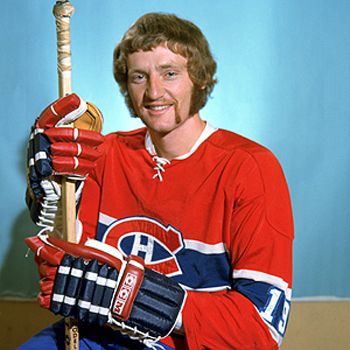
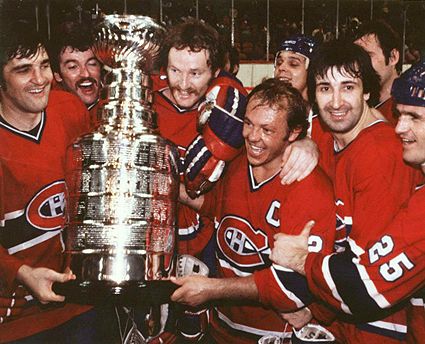
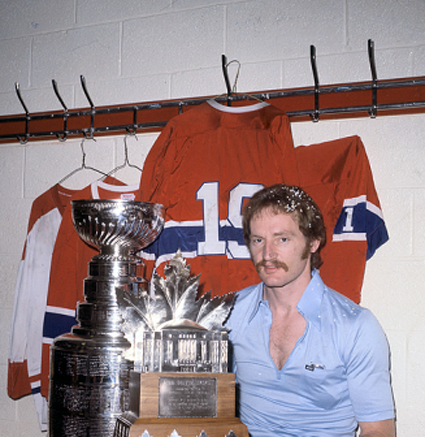
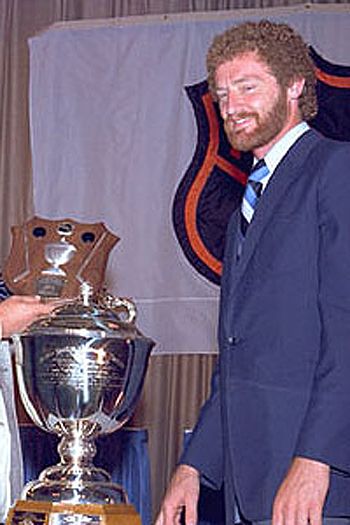
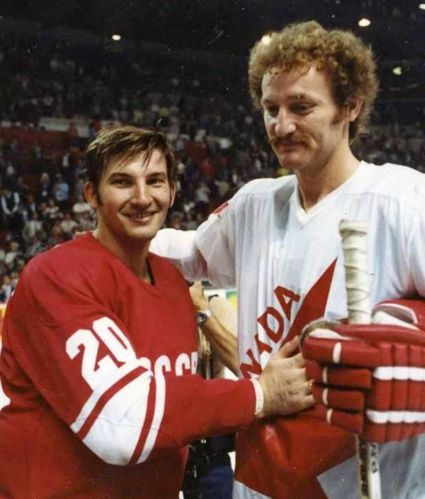
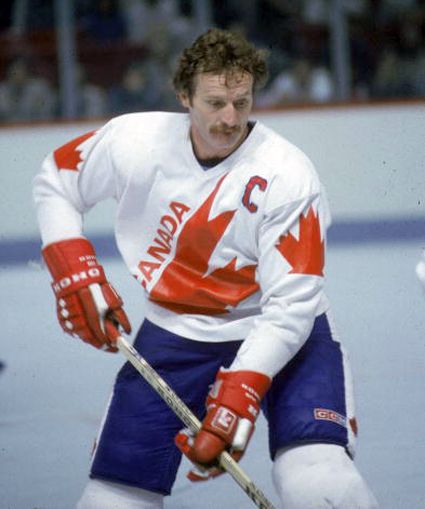
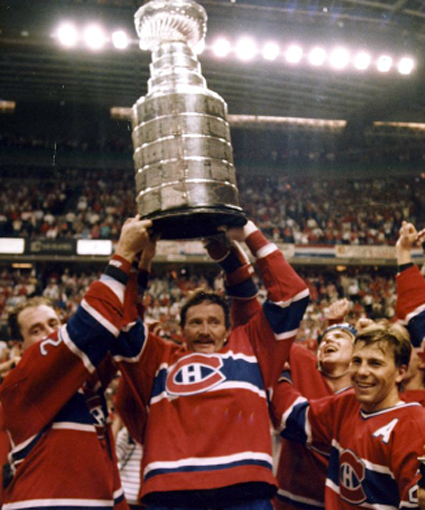
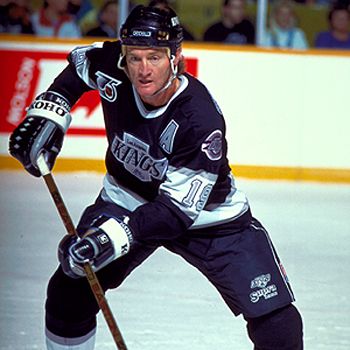
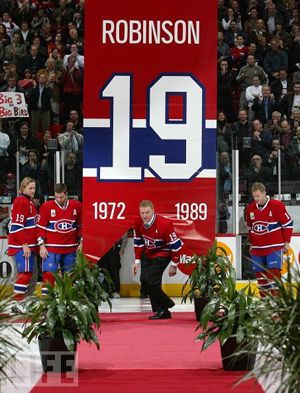
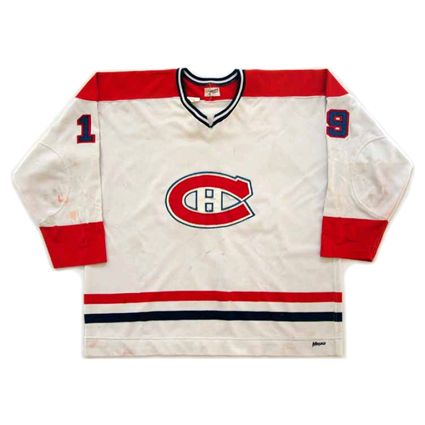
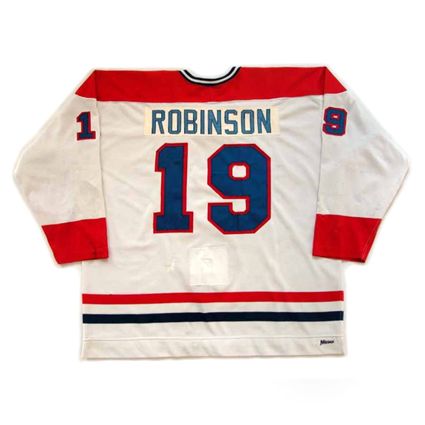
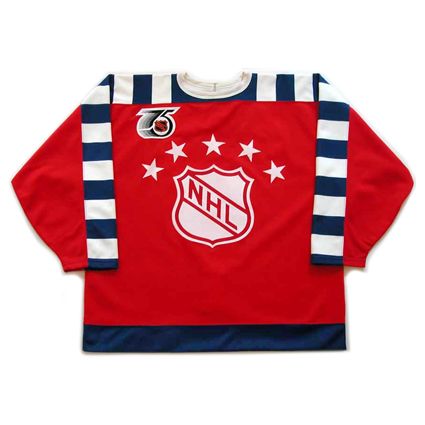
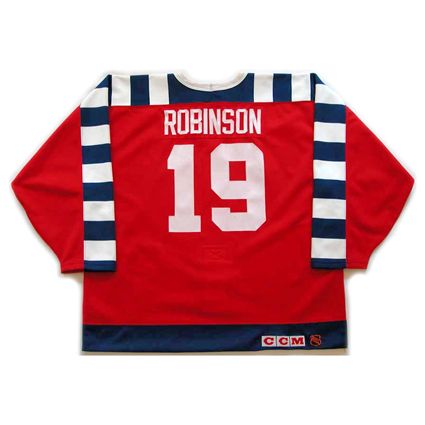
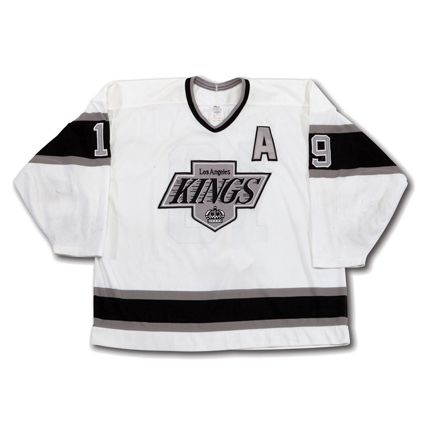
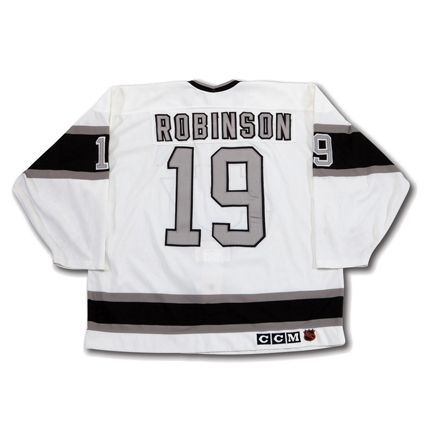










No comments:
Post a Comment
We welcome and encourage genuine comments and corrections from our readers. Please no spam. It will not be approved and never seen.